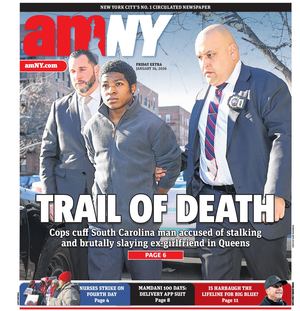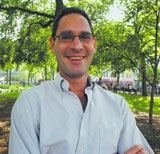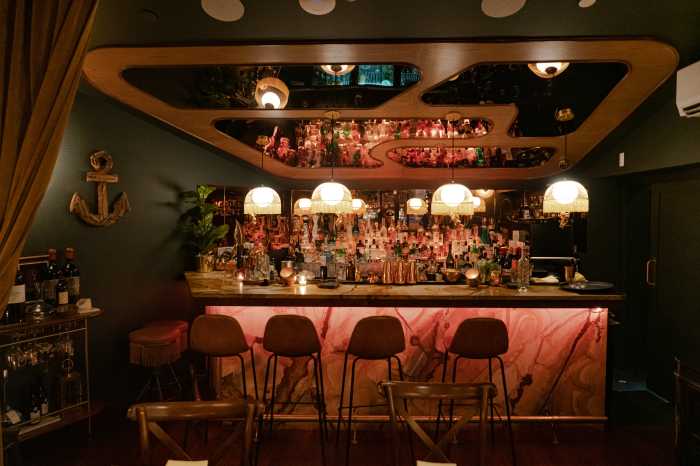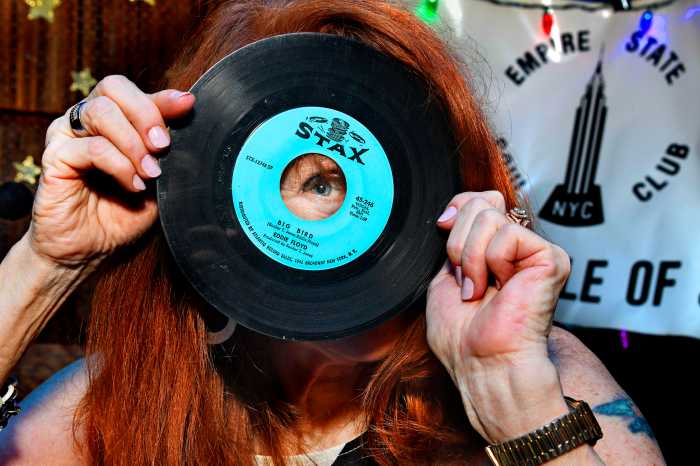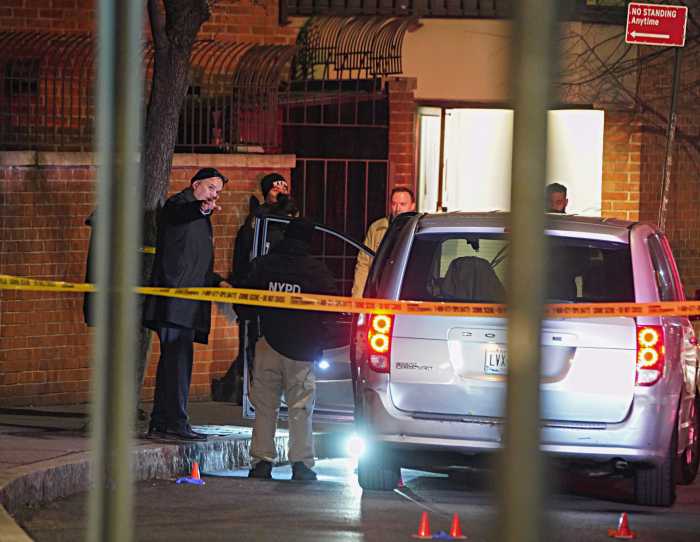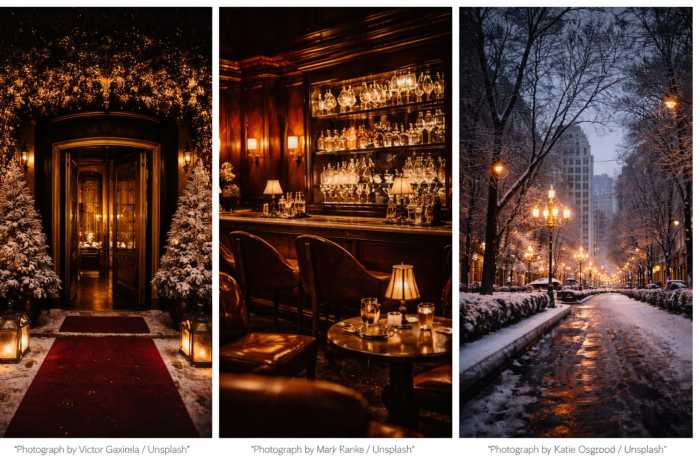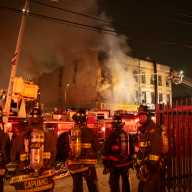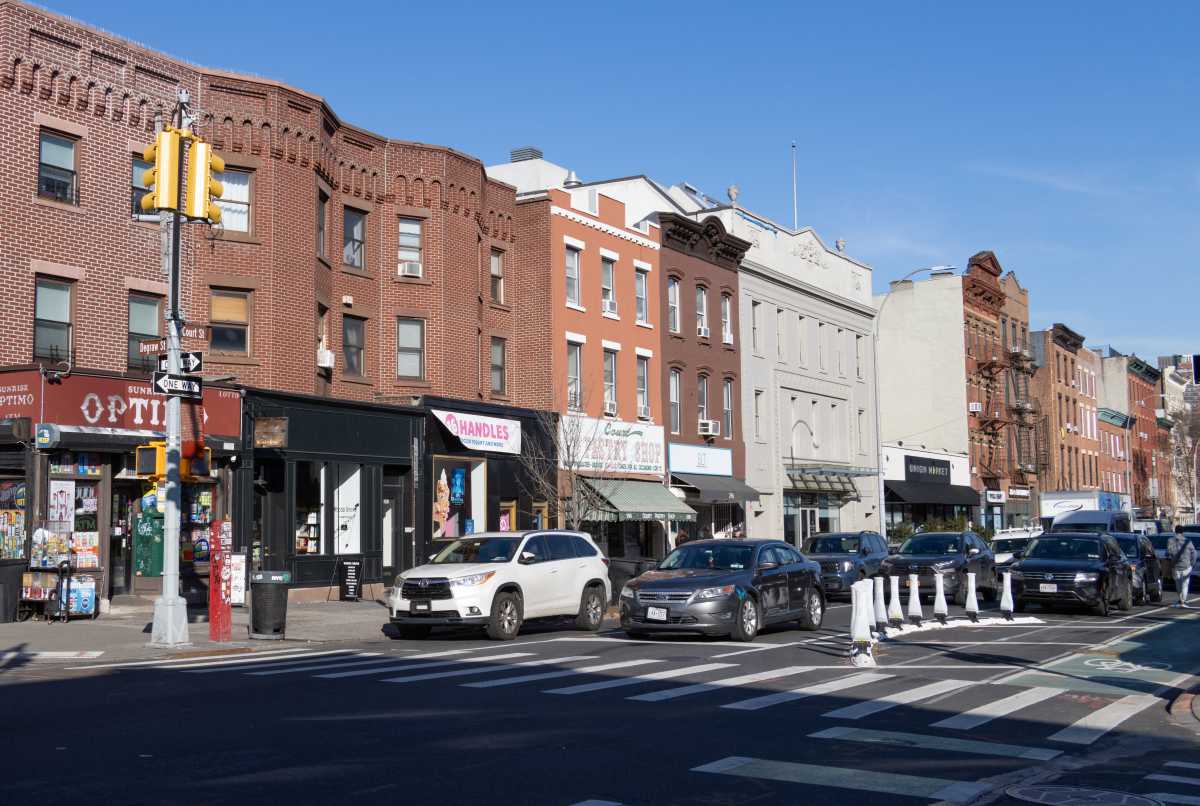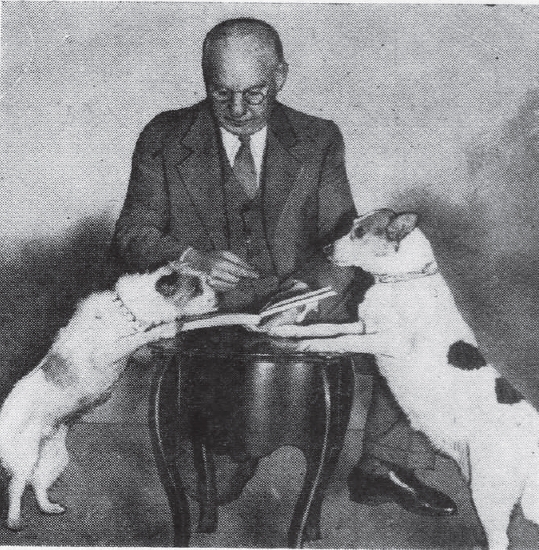By Lincoln Anderson
A bar owner and leading nightlife advocate is squaring off against an art appraiser in the race for chairperson of the Lower East Side’s Community Board 3.
Harvey Epstein, the board’s chairperson for the last two years, announced at last month’s full-board meeting that he would not seek reelection. Epstein, associate director of Housing Conservation Coordinators, a tenants’ advocacy organization in Hell’s Kitchen, told The Villager he decided not to run because of “personal issues.”
The two chairperson candidates are David McWater, owner of four bars in the East Village, and Barden Prisant, president of Telepraisal, an art appraisal service. Nominations for chairperson candidates will be made at the May 24 full board meeting. The election, voted on by the board’s 50 members, will be in June.
There had been some thought Morris Faitelewicz, a Grand St. resident and the board’s second vice chairperson, might throw his hat in the ring. But Faitelewicz said, as of now, he’s not running, citing his responsibilities as a paramedic instructor and emergency response volunteer. He said he may possibly be appointed citywide commander of rescue volunteers for the Republican National Convention and U.S. Open.
If so, he said, “I would not be able to do justice to the position of chair. I have advised all that I will accept re-nomination as second vice chair but would take back first vice chair if Herman [Hewitt] would give it up. Obviously, if I did not get the volunteer position and if all hell broke loose at the May full board meeting and I was nominated from the floor I would have to consider.”
Both McWater and Prisant have been on the board four years. McWater was appointed by Manhattan Borough President C. Virginia Fields, who, it’s been generally observed, has increased the number of businesspeople on the boards. Prisant was appointed by Councilmember Margarita Lopez.
McWater’s appointment as merely one of 50 members of Board 3 initially sparked anxiety and a flurry of outrage among local anti-bar watchdogs. In a June 2000 interview with The Villager, McWater blasted his critics, declaring, “For a long time the community boards have been the bailiwick of these anti-bar groups. This is not their bailiwick anymore. That’s what they’re upset about.”
Four years later, the bar owner — who admits he once hoped to be a politician — is now poised to run the bailiwick.
Originally from Oklahoma, McWater, 38, moved into the Lower East Side in 1985, settling on Stanton St., while attending New York University. He has four bars on Avenue A, Doc Holliday’s — his first, a roadhouse-style, $2 Pabst-serving honky-tonk, which he opened in 1992 — Nice Guy Eddie’s, The Library and Julep, and also manages Cabin, formerly Black Star, on Second Ave. He was part owner of Opaline on Avenue A until late last year, but no longer has an ownership interest. “I’m little neighborhood bars,” he said of his places. “I don’t have tickets, I don’t have deejays.”
McWater organized a fundraiser for Lopez’s borough president campaign at Opaline last year.
McWater is also the New York Nightlife Association’s vice president of government affairs. According to its Web site, NYNA is “the voice of New York City’s bars, clubs and lounges…an association of owners, managers and staff from some of the city’s top nightlife establishments, who believe New York City is the nightlife capital of the world and want to keep it that way.”
However, McWater said he is resigning from his position with NYNA, “because I’d rather do this [be Board 3 chairperson] and I don’t have enough time to do both.”
McWater, who is unmarried but in a serious relationship, more recently lived on E. 11th St., where he was a neighbor of Lopez, who is a friend. Since 1999, he’s lived on Suffolk St.
He said he envisions the board chairperson as being “apolitical,” someone who can “create openness.”
“I’m running on a platform of fairness and ethical decorum,” he said. “You can never have too much propriety.”
He has never been chairperson of a C.B. 3 committee, but is a member of the board’s State Liquor Authority Committee, which reviews new liquor license applications and renewals.
McWater said he and Prisant don’t really differ on issues, noting, “There’s not much we disagree on.”
However, he said he feels that from his work with NYNA and on the S.L.A. Committee he has more experience dealing with city government and so would be more persuasive in advocating for the East Village and Lower East Side.
“The number one problem is we’re treated like a stepchild by the city,” McWater said. “They close a Con Ed plant in Midtown and double the plant’s size down here; they give away our school to Bard; CHARAS…. If you look at any issue that comes before this board, it’s always a case of we’re being mistreated by the city. Giuliani sold CHARAS. He wouldn’t have done that if that was on Park Ave. or in Tribeca.”
McWater is also president emeritus of the East Village/Lower East Side Chamber of Commerce, having stepped down as co-chairperson last year. He enjoys coaching the Lower East Side Gauchos, a Super Little League baseball team who are the reigning champs of the Felix Milan Little League.
Prisant, who grew up in Massachusetts, runs Telepraisal, an art appraisals and research company on Union Sq. he started while a student at Yale. Over the last four years, he has been chairperson of six different committees and task forces on Board 3, including chairperson of the board’s Housing Committee the last two years.
“I think I’ve been building to this — not as an intentional thing,” Prisant said, of his run for chairperson.
He also chaired committees and/or subcommittees on Con Edison; zoning; 215 E. Houston St. (where the goal was to insure low-income tenants evacuated due to unsafe conditions would be able to return to the renovated building); and the Cooper Sq. Task Force.
“I try to be fair, so that everyone can have an opportunity to speak their minds,” he described of how he runs meetings.
Prisant, 44, whose grandfather was born in the neighborhood 100 years ago and lived on Jefferson St. — but whose family left the area long ago for Long Island — has made the East Village his home since 1986. He’s married with a young child.
His biggest concern is outside developers profiting at the neighborhood’s expense.
“It really infuriates me when I see other forces from outside the neighborhood come in and try to take advantage,” he said. “These outside forces — most of them developers — are making it unlivable for those who have put their lives on the line — like Olean For.”
(For, who ran the All People’s Garden near Avenue D across from Prisant’s building, died on May 9.)
Prisant disputed McWater’s claim that McWater has more experience dealing with city agencies.
“I’d say he and I have tapped the same sources,” Prisant said, “myself, in my capacity as chairperson of various committees.”
Bars have been one of the most inflammatory issues in C.B. 3 over the last decade, during which the area has morphed into a busy nightlife district, raising cries of “oversaturation.” Board 3’s initial strategy was to impose moratoriums on new liquor license applications on streets it considered inundated with bars, such as Avenue A and St. Mark’s Pl. Feeling the S.L.A. was unresponsive, earlier this year the board passed a resolution to automatically disapprove liquor license applications on these streets as well as others it deemed oversaturated.
As for whether his owning bars makes him ill suited to be chairperson, McWater pointed to his stint on the board’s S.L.A. Committee, saying it shows he’s fair and impartial. He said local anti-bar activists who have attended the meetings even will vouch he’s done a good job. However, not naming names, he said certain activists trying to “build a constituency” through their work, still won’t give him a break.
“What are the two liquor license issues? Proliferation and bad bars,” McWater said. “I’ve never been an advocate of proliferation. Certainly, nobody has been more of a disciplinarian than me.”
On proliferation of new liquor licenses, McWater noted that each of his bars had a liquor license since at least 1990, so he personally hasn’t added to the number of places serving alcohol.
“I’ll never buy a hardware store and build a bar from scratch,” he vowed.
As for establishments that cause problems in the neighborhood, McWater said, “I’m the first say to bad bars, ‘You’re not going to get any pity from the industry, because we just don’t need it down here.’ ”
McWater added that his knowledge of the industry lets him be “creative” in dealing with potential problems. He said he sometimes headed off bad situations before they could occur by telling applicants at committee meetings — or in private conversation — that they should just give up their plans and cut their losses.
In fact, McWater said he thinks the East Village and Lower East Side are close to being maxed out in terms of liquor licenses and that there may now start to be a decline in the number.
“Proliferation is over,” he asserted. “Just about anybody who could be forced out of business by a landlord [for a new bar] has been forced out. Now it’s about discipline.”
Melissa Leggieri, president of the St. Mark’s Pl. A-1 Block Association, said McWater has been pretty good, helpful even, on the S.L.A. Committee.
“I have to say that he has backed us up as to the moratorium on St. Mark’s Pl. two and a half years ago. He put some of the teeth into it,” she said. “His voting has not been against what the St. Mark’s Block Association wanted.”
Nevertheless, Leggieri is uncomfortable imagining McWater as board chairperson.
“I still feel,” she said, “that as a guy who owns — what? — four or five bars, is vice president of the New York Nightlife Association and vice president of the East Village Chamber of Commerce, I think that puts him in an all-around conflict-of-interest position.”
Although last year’s Community Board 2 chairperson election, in Greenwich Village, between Jim Smith and Brad Hoylman was politically fraught, Prisant and McWater said they don’t see their contest shaping up that way.
“We are friends from before our tenure on the community board,” said Prisant. “We have a perfectly candid relationship on the community board — I hope this doesn’t ruin it.”
“I’ve known Barden for eight or nine years — he was a customer at Nice Guy Eddie’s,” McWater said. “I’m not going to attack him.”
Asked what he thought his chances of winning were, McWater said, “I wouldn’t be running if I didn’t think I could win.”
Barden Prisant in Union Sq. Park near his office
